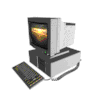|
||
eyeoftig.mid (31,653 bytes) Press play to start |
||
| Why upgrade? | ||
| You have a chance of saving money when you upgrade a home computer instead of buying a new one, plus you have the added benefit of being able to continue to use certain parts that you've gotten used to. The whole key to upgrading your home computer is what you've got to start out with. If you're upgrading a computer that you built yourself or a generic clone, you shouldn't have too many problems upgrading. If you're trying to upgrade a name brand computer such as a Compaq, Packard Bell, or Hewlett-Packard, you're probably going to run into problems. Other companies such as Gateway or Dell tend to be pretty generic. The name brand computer companies tend to use proprietary construction methods that lock you into them at a much higher cost if you want to upgrade anything. The "official" reason they do this is to prevent infringement on other companie's copyrights. This answer may be somewhat true, but I still think the unofficial reason is so that they can lock you into coming back to them for upgrades. | ||
| [Return to top] | ||
| Before starting | ||
| Before starting to upgrade your home computer, make sure that you have sufficient backups of your important data. You never know what might go wrong to cause your data to be destroyed. Also make sure you have the tools you're going to need. For the most part, all you need is a small flat-blade screwdriver, an average Phillips screwdriver, and a pair of needle-nose pliers. You don't need to worry about getting shocked when working on the inside of the computer. The power supply is the only place where there are any significant voltages. The rest of the computer uses 5V, which you aren't even going to feel. Actually the computer should be more afraid of you, because the static electricity in your body can destroy electronic components. Make sure you've discharged any static electricity before working on your computer. | ||
| [Return to top] | ||
| What should I buy? | ||
| Check out my Hardware Specifications page and plan out what you're going to buy. This page covers most of the problems you're going to run into when upgrading. The two biggest upgrades are probably adding additional memory and increasing hard disk space. The Hardware Specifications page takes into account what you have to consider when purchasing either of these components. Hopefully you kept any documentation from your motherboard or your hard disks to be used in this process. I keep a notebook on each of my computers that has the documentation for each component on it. | ||
| [Return to top] | ||
| Where should I buy it? | ||
| It depends on what you're buying. Most items I buy at a local computer show or mail order through the Computer Shopper. The exceptions are hard disks, monitors, modems, and peripherals such as printers or scanners which I like to buy someplace like Best Buy or CompUSA, where I can take it back if there's a problem. These items are the things that I've had the most problems with through the years. | ||
| [Return to top] | ||
| Other Sources of Information | ||
|
||
|
||
| [Return to top] | ||
| Last modified: 08-29-99 | ||
